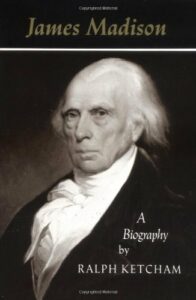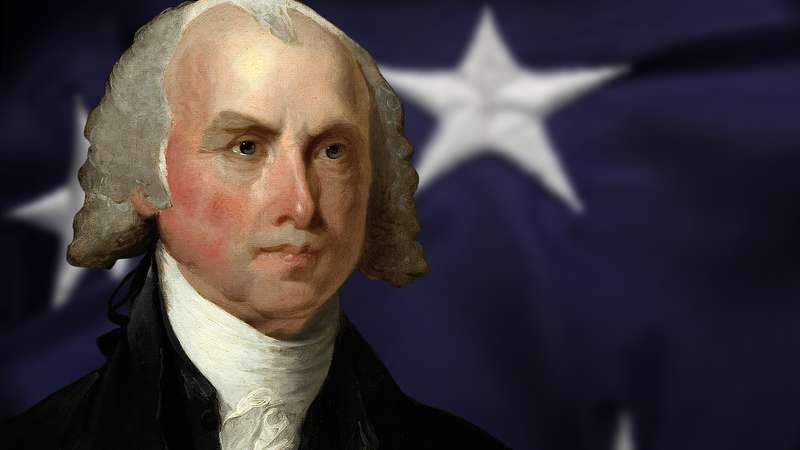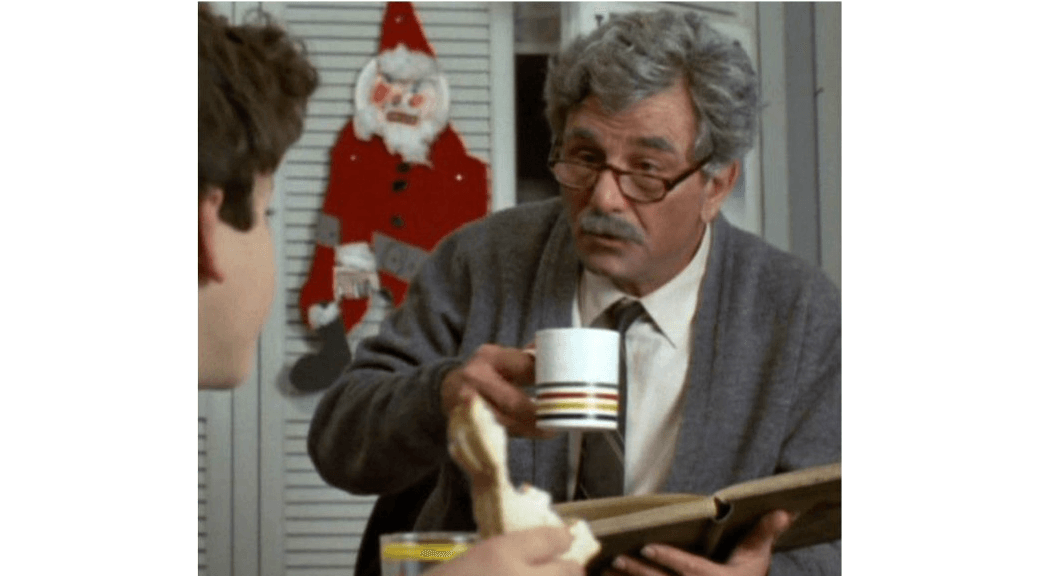Welcome to the fourth installation of my journey through the presidency via presidential biographies. Today, we discuss James Madison, the fourth president and more importantly the primary author of the Constitution. Madison was the first wartime president and was another president of the early period of the United States that could never, ever, ever be elected president in the 21st Century. (I think of the first four presidents, only Jefferson would likely be able to obtain the White House today.)
I am writing these essays primarily for myself to kind of solidify my thoughts about these men, the times in which they lived, and how they impacted the United States. The fact that I’m publishing them, though should indicate that I want to share my thoughts with you, too. Even if none of you read these articles I will write them. But, if you do read them, I’d appreciate a comment or a question as it does provide some additional incentive to keep going. 😊
Background
James Madison was born on March 16, 1751 in Belle Grove, Virginia and he died on June 28, 1836 at his home Montpelier, in Virginia. He was president from March 4, 1809 to March 4, 1817, having won the 1808 and 1812 elections. Madison is best known as the primary author of the United States Constitution and Thomas Jefferson’s chief ally and, I would argue, the substantial intellectual force behind the republican movement. George Clinton, Jefferson’s second vice president remained in that role at the beginning of Madison’s presidency, but he died on April 20, 1812. The vice presidency remained vacant until the beginning of Madison’s second term (note that it wasn’t until the 25th Amendment – adopted in 1967 – that a vice president could be replaced by nomination of the president and confirmation by the both (!) houses of congress). Eldridge Gerry was the fifth vice president, serving from March 4, 1813 until he died on November 23, 1814. Both of Madison’s vice presidents died in office! Interesting aside: the practice of gerrymandering is named after our fifth vice president. Also, they had virtually no role in the Madison presidency and will not be mentioned by name again in this piece.
We had an exceptional run of presidents in terms of their experiences prior to being president. Those of us who are old enough to remember George H.W. Bush remember that his resume was a selling feature of his campaign. Likewise, Hillary Clinton touted her resume. Oh yeah? Did you folks write the Constitution of the United States? Were you a member of the First Congress of the United States? Did you hold the office of Secretary of State when the United States completed the Louisiana Purchase? No? Well, sit down then.
What I knew About Madison before Reading this Book
I knew that Madison was president during the War of 1812, that he was the primary author of the Constitution, that he was really short, and that his wife was highly regarded as a first lady who still hawks Zingers cakes to this day. As I have mentioned before, I visited both Mount Vernon and Monticello, but I did not visit Montpelier. I had only two days reserved for visiting presidential mansions. I did see signs advertising Montpelier, but we did not go. I now regret that.
The Experience of Reading James Madison: A Biography
 The book that I selected to read about Madison was James Madison: A Biography by Ralph Ketcham, which was first published in 1971. The book is 671 very dense pages, exclusive of the end notes and is fairly small print and it may be longer than the 818 page Chernow book on Washington. I finished the book on February 28, 2021. This book is not at all like the first three books that I read. I think that part of this is because Chernow, McCullough, and Meacham wrote books that are intended to be read by a wide audience. Ketcham, a professor, probably wanted to have his book read by a wide audience, too, but I think he was more focused on a more scholarly account of Madison (although it is only 671 pages, so…). Make no mistake, though, Madison, unlike the first three characters of this book, was not a larger than life figure. He was studious, reserved, not as… interesting. While this book is not as accessible, it is still a very well written book. Madison, as Jefferson’s right hand man, comes off as underhanded in the Chernow book especially. This book, written 40 years before Chernow’s provides what I think is a pretty fair assessment of the fourth president. I should note that this is the last book that I read where I didn’t take any notes, and honestly, I’ve forgotten a lot of the details of the book now. I simply don’t have enough time to go back and do research or re-read the book. In the interest of keeping this series going, I will simply acknowledge that and move on.
The book that I selected to read about Madison was James Madison: A Biography by Ralph Ketcham, which was first published in 1971. The book is 671 very dense pages, exclusive of the end notes and is fairly small print and it may be longer than the 818 page Chernow book on Washington. I finished the book on February 28, 2021. This book is not at all like the first three books that I read. I think that part of this is because Chernow, McCullough, and Meacham wrote books that are intended to be read by a wide audience. Ketcham, a professor, probably wanted to have his book read by a wide audience, too, but I think he was more focused on a more scholarly account of Madison (although it is only 671 pages, so…). Make no mistake, though, Madison, unlike the first three characters of this book, was not a larger than life figure. He was studious, reserved, not as… interesting. While this book is not as accessible, it is still a very well written book. Madison, as Jefferson’s right hand man, comes off as underhanded in the Chernow book especially. This book, written 40 years before Chernow’s provides what I think is a pretty fair assessment of the fourth president. I should note that this is the last book that I read where I didn’t take any notes, and honestly, I’ve forgotten a lot of the details of the book now. I simply don’t have enough time to go back and do research or re-read the book. In the interest of keeping this series going, I will simply acknowledge that and move on.
Madison’s Life Before Presidency
Madison was born into a wealthy family in Virginia and he was a distant relative of the twelfth president of the United States, Zachary Taylor. Madison attended what is now Princeton University and was an excellent student. He was a member of the House of delegates and of the Continental Congress during the war. Madison was seen as frail and of poor health (he lived to be 85 in early America!) and he never served in the war.
Madison was a member of the first House of Representatives of the United States, and he won his seat in Congress by beating some dude named James Monroe (yes, that James Monroe). Monroe is seen generally as an ally of Jefferson and Madison and, as the fifth president of the United States, he generally carried on the Jeffersonian tradition. But, in 1788, he was an opponent of Madison’s (and a favorite of some sectors in Virginia politicians including Patrick Henry who were anti-federalists, that is, opposed to the new Constitution – that seat was gerrymandered to help Monroe), but not a successful one. Some people in the Democratic-Republican party wanted Monroe to challenge Madison for the presidency. That did not happen, of course. Madison teamed with Jefferson to challenge the Washington administration’s policies and Madison shamefully wrote the so-called Virginia Resolutions, a companion to Jefferson’s Kentucky resolutions, advocating for the poisonous idea of nullification of federal laws by the individual states, a virus that remains in circulation until this very day.
Madison was also Jefferson’s Secretary of State and he, along with Jefferson, disapproved of Monroe’s negotiations with the British in a treaty that Monroe signed but was never presented by the Jefferson administration for ratification by Congress. The Jefferson administration felt that the treaty was a failure because it did not end the British practice of impressment. The British would board US ships and try to recapture British sailors that had abandoned the British navy to join US merchant ships. In the process, the British would nab Americans and force them into the British navy. Eventually, as president, Madison would initiate a war over this issue, the War of 1812. Madison, in his capacity as Secretary of State was a party in the most consequential Supreme Court decision of all time. There was one other thing: he was Secretary of State when the US purchased Louisiana from France, although Madison didn’t really have much to do with that. He sent Monroe to negotiate the purchase of New Orleans and he went off and bought the whole damned thing. It’s kind of like going to Target for paper towels and coming home with a car full of stuff.
Of course, Madison’s key contribution to the United States before he became president was his role in authoring the United States Constitution. Madison understood that the early American government was weak and ineffectual and recognized the need for a strong federal government, or at least a stronger one than existed. Madison was a primary author of a so-called Virginia Plan, which was the framework upon which the United States Constitution was drafted. Alexander Hamilton convinced Madison to help author the Federalist Papers after Madison had urged members of Congress (he was one) to remain neutral in the ratification process. There was a surprising amount of resistance to the new Constitution (you may remember that Washington was president for over a year before all of the states ratified it). The whole Constitutional debate is very interesting … some were opposed to the new Constitution because the Constitution as originally ratified was focused on the powers of the Government and not the liberties of the people (i.e., there was no Bill of Rights). Others felt that a strong central government would not be good for the individual states. Madison himself wrote the Bill of Rights, which further cements his legacy as one of the most important founding father.
Madison ended up being an effective advocate for the ratification in his home state of Virginia, where significant resistance existed. I am not going to write about the Constitutional debate in detail here, because I would have to go back to the book and reread it a fair amount. But, one of the key touchstones of the original Constitutions was the 3/5ths Compromise. In the 21st Century, this concept has become shorthand for how black people were considered less than fully human. And indeed, it looks pretty awful 200 years after the fact. But I would submit that this is much less odious than, you know, allowing slavery in the first place. Northern states did not want enslaved people counted at all for the purposes of taxation and, more importantly, representation in the U.S. House of Representatives. The southern states, of course, wanted their slaves to be counted for representation purposes. The 3/5ths Compromise, first proposed by Madison, to count 60% of the slave population for taxation and representation purposes. It sounds very bad. In practice, it was very bad in those days, because it granted more power to the slave states to perpetuate policy to maintaining slavery, both in the House of Representatives and, of course, in the White House because of the electoral college. Bad as a symbol and bad as policy. Some historians have said that if slaves had not counted at all in the matters of taxation and representation, Adams would have won the 1800 presidential election, there would have been no slavery in Missouri, Jackson’s Indian removal policy would have failed and various other pro-slavery acts would have failed. In other words, counting slaves as 3/5ths of a person – instead of not at all – actually perpetuated slavery in the United States. I realize that this is a complex issue and slavers were not going down without a fight. But, man.

I’ve heard the notion in some quarters that the Constitution was divinely inspired. Not seeing that.
Key Challenges/Features of Madison’s Presidency
Madison started with an ineffective cabinet, especially in the Secretary of State role and Madison basically distrusted his cabinet. He made a key move early on, though, and installed his frenemy, James Monroe as his 2nd Secretary of State. I’ve come away from this period believing that Monroe was vastly underrated relative to Jefferson and Madison – he may not have had the same intellectual prowess as these guys, but he was a doer and he saved Madison’s hide. Monroe was not shorted in the old ambition department, but we will get to that next time.
The key challenge of the Madison presidency was handling the ongoing conflict with England. As Jefferson’s right hand man, he had supported Jefferson’s disastrous embargo law, which forbid any foreign trade and the subsequent policy of only forbidding trade with France and England. The United States’ position in the ongoing warring between France and England was to be neutral. Madison then attempted to pit England and France against each other by trying to establish trade with one party or the other if they agreed to stop attacking American ships. Napoleon agreed to a contingent deal with the US and Madison thought that the British would follow along, but they didn’t and Napoleon reneged (huh). As an aside, the British navy was the undisputed power in the Atlantic. Napoleon had ground force superiority, but the idea that they were somehow equals in the water was absurd.
With conditions not improving, Madison decided that war was the answer. He figured (heh) that with England off fighting Napoleon, the US could just march in and take Canada as a bargaining chip (or as just an expansion of the United States). Congress was behind Madison, so they started a military buildup and eventually, at Madison’s request, declared war on the most powerful country on earth.
I want to stop right here and editorialize. Madison was a pretty smart guy – I think he was the intellectual equal of any president of the first five presidents – but he was completely deluded. The United States did not have a standing army. The United States did not have military leadership capable of matching up with the British. Hell, they could barely handle small Indian tribes. And James Madison thought that they could just kick England’s ass. Unbelievable. Washington probably started spinning in his grave.
Madison’s idea was that the US would attack the British at Detroit, knock them out there and that the northern states’ militias would just push into Canada. He apparently forgot to check in with the northern states who, under the 2nd Amendment, had guns for their well(?)-regulated militias. Turns out that the northern states didn’t want to participate in this war. Detroit fell to the British without a shot fired. No invasion of Canada happened. Madison’s Canada campaign was a complete failure. In addition, Madison didn’t have any funds to mount a fight. So, again, he declared war without an Army, any sort of real plan and no money to pay for it. I mentioned above that his cabinet was ineffective and that was especially true of his War Department. Madison replaced his War Secretary with another incompetent (a fellow named John Armstrong) and eventually turned to Monroe to run both State and War and Monroe proved to be his most effective War Secretary. Armstrong failed to defend Washington, D.C., despite the presence of the British fleet in Chesapeake Bay, thinking that they would head to Baltimore instead of, you know, the nation’s capital. Washington was sacked, the White House and the Capitol were burned and Dolley Madison saved Washington’s portrait. Madison himself had to escape capture on horseback.
Shortly after the war started, Russia offered to broker an agreement with England and Madison sent John Quincy Adams to negotiate. Turns out, though, that the British weren’t so eager to meet. As the war went on, the US did win some battles, and a young general named William Henry Harrison scored victories in what was then the Northwest and Andrew Jackson was victorious in the West. But the British were still pounding the US pretty effectively (see the paragraph immediately preceding this one, where I discuss the sacking of Washington). However, the British were held off at Baltimore (hey, maybe the strategy worked!) and turns out that the British public was not in favor of blowing cash and their young men in foreign misadventures. Eventually, a peace deal was hammered out in Europe the terms of which were similar to those in the treaty that Monroe had negotiated in 1806.
After that treaty was signed, but before anyone knew that in the US, Andrew Jackson scored his huge victory in New Orleans, and the public eventually believed that the British were forced to negotiate because of the glorious victory in New Orleans. Not true, but Madison’s popularity improved post war. So, was the war worth it? On the one hand, the US entered a war with grand designs, no real war plan, and without any sort of army that could actually fight directly even against a British army that was distracted by the French in Europe. The terms of the treaty could have been achieved a decade earlier, had Madison and Jefferson backed the treaty that Monroe negotiated. On the other hand, I think the British realized that they didn’t want to be fighting wars in the US every 25 years. War is expensive and the British realized that they couldn’t actually control the American continent anymore (I think this point is made in the book I read on Monroe, actually). So that was a benefit. Add in a misunderstanding of the real import of the Battle of New Orleans, and you had an American people who believe the war was a great success.
But ultimately, the threat on the seas ended when Napoleon met his Waterloo. France was defeated and the primary threat to England – France – was removed. That would have happened without the War of 1812. In retrospect, this looks like a war that could have been easily avoided. Would the British eventually mounted another campaign in the US? Hard to say. But, 200 years after the fact, it’s hard to say that Madison did a good job conducting this war or preparing for it. Nevertheless, he reaped benefit for it.
Madison weathered the war amazingly well, he would not have done so in more modern times, I would think (then again, the US military of the 21st century is a little more organized than what Madison had in 1812). Madison, unlike Jefferson, was much more of an adherent of limited government principles. Reading about Jefferson 200+ years after his presidency, I could both point to his willingness to set aside his principles for the sake of expediency and applaud him for recognizing that the definition of the federal governmental power was going to need revisiting as the country grew. It is also true that relying on Constitutional Amendments was not going to be an effective way to grow the federal government as it needed (I think) to grow. Damn it, the Louisiana Purchase was a good idea and waiting around for Constitutional Amendment might have prevented it from happening.
Madison was not so pragmatic. He was in favor of spend federal government money on so-called internal improvements (infrastructure!). At the end of his presidency, the Congress had an Infrastructure Week and passed a bill for internal improvements, including projects that Madison favored. With four days left in his presidency, Madison vetoed it. He felt that the bill was unconstitutional – he thought that the Congress needed an Amendment to the Constitution before it could make such improvements. Note that this was post Marbury v. Madison when the Courts had asserted their power to make such determinations. No president after say, 1829, would ever veto a bill on such grounds. One wonders, then, if Madison’s objection to the Alien and Sedition Acts were because of the policy or the Constitutionality? No president would veto a bill because they simply didn’t like the law until Andrew Jackson. Would Madison have objected to an Adams veto here if he felt the Acts were Constitutional? I think he may have.
This kind of thinking, while perhaps noble I suppose, did the US no favors. I would argue that having the federal government finance the building of roads and bridges to make travel a little less formidable might have impacted Commerce between the States. Having the author of the Constitution weigh in on the side of such laws being consistent with the powers of the federal government might have pushed the United States into a different direction. I haven’t read about presidents beyond 1841, so I don’t know if such ideas have come up after that. 😉 But, supposing they did, I would imagine that they would have been contentious – just how far could Congress go in regulating Commerce between the several States? Stay tuned, we will find out if that ever happened!
Madison’s Post-Presidency
After he retired, Madison moved back to Montpelier and lived out his life (he would live 19 more years). He largely stayed out of presidential politics, including the contentious election of 1824, but he was available for advice to presidents. The Ketcham book discusses some about Madison’s effort to burnish his legacy by altering some of his earlier papers. Other sources suggest that his “efforts” here were somewhat of an obsession. It is… unfortunate that he would do such a thing. Madison was also a part of the rewriting of the Virginia constitution in the late 1820s.
Like Washington and Jefferson before him (and Monroe after him), he left the presidency a much poorer man than when he entered it. On the one hand, I see this as a shame. I’m not in favor of making presidents fabulously wealthy on the taxpayer’s dime, but I do think a reasonable pension is good policy. Madison was not a spendthrift like Jefferson, he suffered a lot because of his step-son’s financial irresponsibility. On the other hand, Madison was wealthy in the first place because of his inheritance of a slave plantation (so hard to feel sorry because of the ownership of humans) and the decline of Virginia plantations due to the impact that tobacco had on their farmland and falling tobacco prices affected that entire region, not just the former presidents.
Madison’s Family Life
Like Washington, Madison married a young widow and did not have children of his own. Unlike Martha Washington, though, she did not bring Madison wealth and indeed, her son was a tremendous financial strain on Madison.
Madison was not, unlike any of his predecessors, much of a ladies’ man and he did not marry until he was 43 years old. Ketcham writes about a romance that Madison had with a young woman when he was in his mid 30s with a 15 year old girl. Madison was apparently an awkward suitor and unable to convince this child to marry him. The idea that a 35 year old man would be courting a pubescent girl is pretty gross to contemplate in modern times. However, I’m not sure it was all that unheard of back then, and it further highlights the ways in which our society has evolved. I’m not saying that Madison was some sort of Matt Gaetz, but what I am saying is that Gaetz would have significantly fewer problems had he lived 200 years ago.
The story is that Aaron Burr was the person who introduced Dolley Madison (and there is some confusion as to the spelling of her first name, but Dolley is what Ketcham uses) to Madison and the general feeling is that Madison was quite happy with his mate. Dolley was a very popular first lady and a great asset to the president. While Madison was seen as somewhat of a dour figure, his wife was a great entertainer. There were some rumors of Dolley being unfaithful, but those rumors were mainly forwarded by Madison’s political opponent.
Madison cared for her son even when he was an adult and a financial burden. It is interesting that Washington, Adams, and Madison all had children or step-children that were huge financial burdens. These guys were probably not great fathers – they put their careers ahead of their families. The picture painted of Madison the retiree was more flattering in that regard. Once retired, family becomes more important, I guess.
An interesting side note not covered in the book: in his will, Madison left a fair amount of money to various causes, leaving only $30,000 for his wife (I think he thought he had more than that left). She lived another 13 years after he did and would up pretty much destitute. Daniel Webster, in an effort to help the former first lady, bought her personal slave and freed him. There she was, basically destitute, but she still owned another human being. Truth be told, after a lifetime of involuntary servitude, her slave likely had nowhere else to go.
James Madison: The Man
Madison appears to have been the classic high minded intellectual: aloof, awkward around members of the opposite sex, and wrestling with complex ideas without an instinct towards pragmatism. And yet, he was enormously influential in early America. He provided a framework for the Constitution that, despite its limitations, was a profound improvement over the government that preceded it. He was like a one-man think tank for Thomas Jefferson and his ideas impacted how America operated for a very long time. As president, he struggled in his role as commander-in-chief, the exact type of role that an intellectual is going to struggle in. Given the lack of a real military leadership, more responsibility fell on him than might otherwise and I think he was not particularly good at it.
As I mentioned above with regard to his Infrastructure Week moment, I think Madison could have benefitted the country with a little of Jefferson’s pragmatism. I don’t want to dismiss Madison’s (I think, incorrect) decision to veto that bill out of hand. Madison was wrestling with a profound concept: just how powerful should the federal government be? He certainly, as an architect of the Constitution, was a proponent of a stronger federal government than we had, but he also recognized that the power of the federal government could grow to far. He wrestled with that in real time, without the benefit of 200 years of hindsight, and he wrestled with it in a principled, good faith way. I do not have the impression that he was deceptive or underhanded in the way that Jefferson was. Madison was at one time contemplating the clergy as a vocation and I think he was earnest in his convictions. Today, Madison would probably not have a role in today’s political environment. He would be an intellectual pillar for some political movement (although, I’m not really sure which one).
We cannot discuss these people without mentioning that they owned other human beings. Madison was in favor of ending slave trade at the time of the Constitution, but of course, there was a twenty year moratorium for limiting slave trade in the Constitution (not sure how Jesus came down on that one). He was, in later life, against the restriction of additional slave states and his 3/5ths Compromise extended power to the slave states. Further, while he wasn’t as hawkish on Indian removal as Andrew Jackson, he did believe that Native Americans were savages who couldn’t assimilate into the American agrarian culture.
Madison’s America
The United States of 1809-17 was both on an expansionist course to dominate the continent and a poorly run collection of small states that were often in active competition with each other. On the one hand, the United States (kind of) extended past the Mississippi River (it was going be Monroe – there’s that guy again – that got a more definitive answer as to what, exactly, the Louisiana Purchase included). William Henry Harrison was pushing the natives out of the old Northwest (Ohio, Michigan, Illinois, Wisconsin, and Indiana). Meanwhile, the New England states were off on their own agenda, trying to perhaps reconnect with England and certainly not interested in participating in a national effort to win a war on American soil against the British. This action in New England was more of a death rattle of the old Federalist party than anything, though. By the end of Madison’s presidency, there was the forming of a national consensus on a lot of issues (not slavery). Madison supported the establishment of a Second National Bank (a Federalist concept that Hamilton at one time opposed) and financing of the Cumberland Road. In other words, Madison helped to kill the Federalist Party by supporting its most popular ideas and opposing the whole let’s get back in bed with England part. He could have gone the final mile in signing the internal improvements bill at the end of his term, but he didn’t. (Monroe was much more supportive of internal improvements.)
What Really Surprised Me
It was very surprising to me that northern states were not supportive of the War of 1812 and they would not provide military support to that effort. It is also really surprising that this support was not ensured before declaring war. It really reinforces to me that even almost 40 years after the founding of the Country, America was still a backwater country with a weak federal government.
What one person (not a president) would I want to read about from Madison's era as President?
I’m not sure I know who this would be, as Madison’s life was dominated by his interactions with Jefferson and the sometimes partnership with Monroe. The Madison cabinet, other than Monroe was full of incompetents. He did not appoint a landmark chief justice. Jackson and Harrison were his most effective generals in the war. His vice presidents are almost not a part of the story. Perhaps Dolley Madison herself would be the most interesting character in the Madison story that didn’t also reach the presidency.
Ranking
The latest Sienna poll rates James Madison as the 7th best president overall. He is most highly rated for his intelligence (3rd), his background (4th), his imagination (6th) and ability to compromise (6th), and his court appointments (6th). His biggest weaknesses were identified to be his foreign policy accomplishments (19th), leadership ability (17th), his luck (16th), and his willingness to take risks (15th). Executive ability was ranked 13th.
I would agree that these first two attributes are descriptive of Madison. Insofar as his intelligence ranking is concerned, I think the only debate is whether he was the most intelligent man to hold the White House. I cannot but believe that as a political philosopher, he was every bit Jefferson’s equal and probably then some. Jefferson may have Madison overall in Jefferson’s broad range of intellectual interests and pursuits, but as a political thinker, Madison may have been unparalleled. He is highly rated in his background, with designing the US Constitution, being a congressman, and eight years as Secretary of State filling out a pretty impressive resume.
I’m not so sure about his imagination or ability to compromise, though. He was certainly bound in this thinking to his conception of what the federal government’s power was, as I’ve discussed above. Perhaps he gets points for imagining he could win a war with no practical plan? He did appoint Joseph Story to the court, but his other court appointments were few in number and unremarkable, so I’m not seeing that as a strength, either. I mean, he didn’t appoint Roger Taney, so there’s that.
As for his weaknesses, yeah, initiating the War of 1812, not a great accomplishment. Appointing a completely incompetent cabinet (except for Monroe!) and then not even listening to the cabinet, not great. It seems to me that he was pretty much a disaster from an administrative standpoint and so I would mark him even lower in his leadership ability and executive ability. I think he was extremely lucky that he didn’t have the whole war blow up in his face, actually.
I kind of reject the idea that he was a top 10 president. I think his real accomplishments came outside of his presidency and I would point there first. Without going into the dreadful presidencies that start in about 1841, I’m going to say that Madison wasn’t a tremendous president.
What I Was Looking Forward to after Reading this Book
This is pretty easy. I was becoming more and more impressed with James Monroe (can you tell?) and I really wanted to read about the fifth president of the United States.
How My Understanding Lines Up (or doesn’t) with the Presidential Podcast
I am referring of course to the Washington Post’s Presidential podcast. If you are interested in these posts, but aren’t listening to that podcast, let me suggest that you should. You can find it where you get your podcasts. A youtube link to the Madison episode is here: https://www.youtube.com/watch?v=O6zud62MXng. I like to listen to podcasts at a faster pace and at 1.5 times speed is easy to hear and understand.
Interestingly, the James Madison scholar that is interviewed in this episode points to the difficulties in today’s political climate and asserts that it is the Constitution, with all of its checks and balances that Madison put in that has led us to the point where we are today: a political system where it is very difficult to get things done. He makes the point that the Constitution was written to make a more effective government, not as some libertarian document. The founding fathers wanted a government that actually worked, even as they feared too much federal power. He also makes the point that Madison, unlike Hamilton, didn’t really understand the nature of executive power.
The podcast kind of concedes that his presidency was kind of a bust and that he was a lousy wartime president. The scholar makes the argument, though, that a president need not trample on personal liberties during wartime. Even then, though, there was little support for Madison being a great president and the podcast aligns with my thinking that he wasn’t a very good president.
Another interesting tidbit in the podcast directly contradicts a story in the book that I have related above. In the podcast, the slave who was purportedly purchased by Daniel Webster wrote a memoir and he asserts in that book that he had bought his freedom from Dolley himself and late in her life he gave her funds when she was destitute. Which is correct? ¯\_(ツ)_/¯
What We Can Learn from Madison’s Presidency
Madison possessed certain characteristics that don’t really play well in the modern presidency. He was an intellectual, he saw issues as complex and he wasn’t a real decisive president. The podcast makes a lot of comparisons between Madison and Obama. As someone who is generally supportive of the Obama presidency, I was frustrated with his sometimes less than certainty that Obama would have in public. I get that he was considering complex issues, I just wished that he would contain those contemplations outside of his public pronouncements. I’m not saying that discussing complex issues in public is, in a vacuum, a bad thing to do. I’m saying that Americans don’t have the appetite for it. Put it in your memoirs.

















